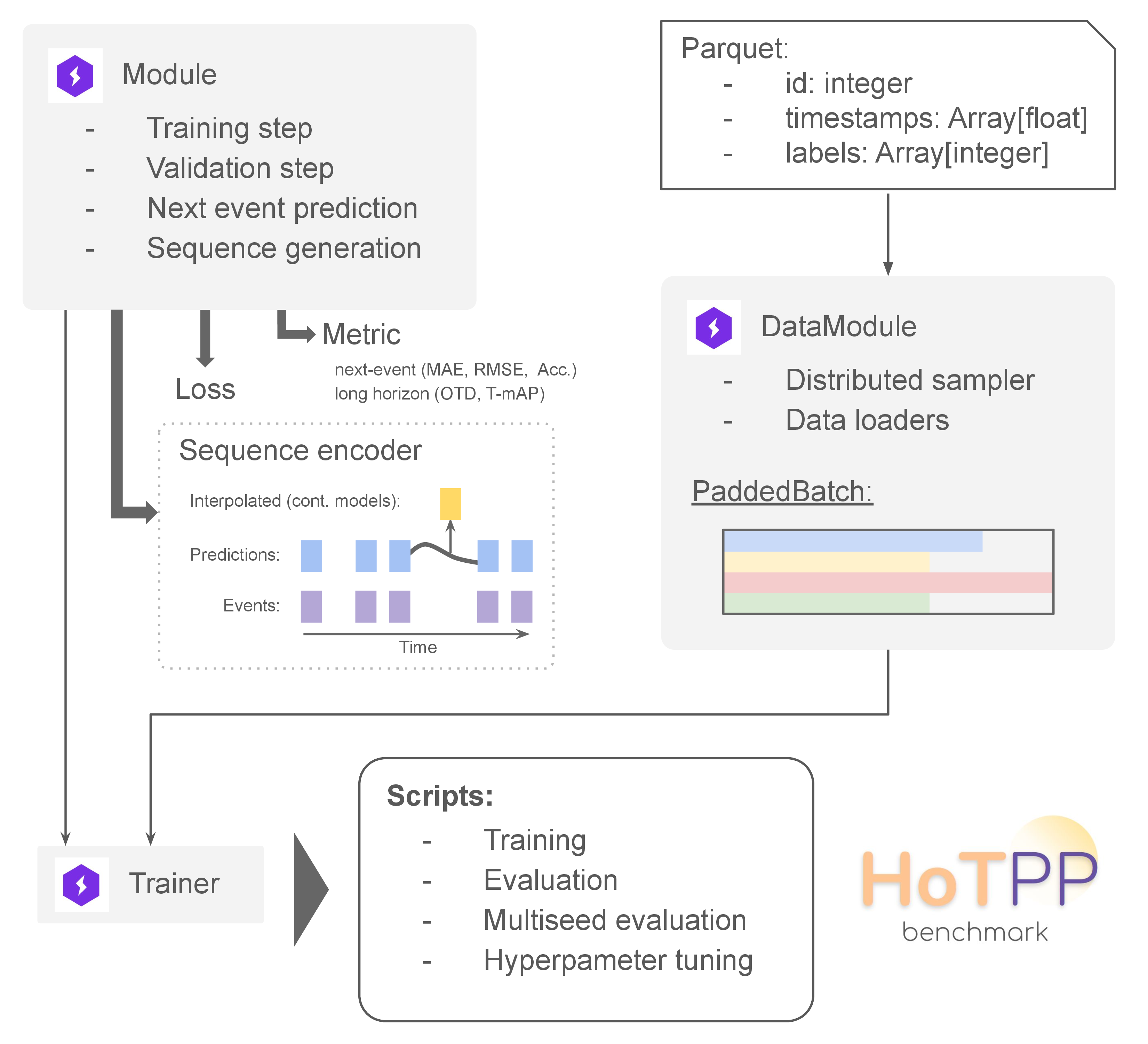The HoTPP benchmark focuses on the long-horizon prediction of event sequences. Each event is characterized by its timestamp, label, and possible additional structured data. Sequences of this type are also known as Marked Temporal Point Processes (MTPPs).
Sometimes the following parameters are necessary for successful dependency installation:
CXX=<c++-compiler> CC=<gcc-compiler> pip install .The code is divided into the core library and dataset-specific scripts and configuration files.
The dataset-specific part is located in the experiments folder. Each subfolder includes data preparation scripts, model configuration files, and a README file. Data files and logs are usually stored in the same directory. All scripts must be executed from the directory of the specific dataset. Refer to the individual README files for more details.
To train the model, use the following command:
python3 -m hotpp.train --config-dir configs --config-name <model>To evaluate a specific checkpoint, use the following command:
python3 -m hotpp.evaluate --config-dir configs --config-name <model>To run multiseed training and evaluation:
python3 -m hotpp.train_multiseed --config-dir configs --config-name <model>HoTPP leverages high-level decomposition from PyTorch Lightning.
DataModule. All datasets are converted to a set of Parquet files. Each record in a Parquet file contains three main fields: id, timestamps, and labels. The id field represents the identity associated with a sequence (user, client, etc.). Timestamps are stored as an array of floating point numbers with a dataset-specific unit of measure. Labels is an array of integers representing a sequence of event types. The dataloader generates a PaddedBatch object containing a dictionary of padded sequences.
Module. The Module implements high-level logic specific to each group of methods. For example, there is a module for autoregressive models and another for next-k approaches. The Module incorporates a loss function, metric evaluator, and sequence encoder. The sequence encoder can produce discrete outputs, as in traditional RNNs, or continuous-time outputs, as in the NHP method.
Trainer: The Trainer object should typically not be modified, except through a configuration file. The Trainer uses the Module and DataModule to train the model and evaluate metrics.
HoTPP uses Hydra for configuration. The easiest way to create a new configuration file is to start from one in the experiments folder. The configuration file includes sections for the logger, data module, module, and trainer. There are also some required top-level fields like model_path and report. It is highly recommended to specify a random seed by setting seed_everything.
Hyperparameters can be tuned by WandB Sweeps. Example configuration files for sweeps, such as experiments/amazon/configs/sweep_next_item.yaml, can be used as follows:
wandb sweep ./configs/<sweep-configuration-file>The above command will generate a command for running the agent, e.g.:
wandb agent <sweep-id>There is a special script in the library to analyze tuning results:
python3 -m hotpp.parse_wandb_hopt ./configs/<sweep-configuration-file> <sweep-id>To achieve reproducible results, it is highly recommended to use the provided Dockerfile. However, there may be minor differences depending on the specific GPU model.
The reference evaluation results are stored in the results subfolder within each dataset directory in the experiments folder.
To run tests, use the following command:
pytest testsIf you use HoTPP in your project, please cite the following paper:
@article{karpukhin2024hotppbenchmark,
title={HoTPP Benchmark: Are We Good at the Long Horizon Events Forecasting?},
author={Karpukhin, Ivan and Shipilov, Foma and Savchenko, Andrey},
journal={arXiv preprint arXiv:2406.14341},
year={2024},
url ={https://arxiv.org/abs/2406.14341}
}

